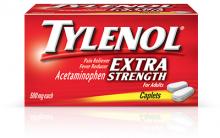
Johnson & Johnson ($JNJ) scored a victory in the first case to go to trial over claims that its blockbuster painkiller Tylenol causes liver damage and its dosing doesn't adequately account for the risk. A New Jersey jury ruled that the plaintiff did not prove that she took the painkiller.
Jurors dismissed plaintiff Regina Jackson's claims that she spent a week in the hospital for liver damage after accidentally overdosing on Extra Strength Tylenol, concluding that she couldn't prove that she used the J&J product.
But the jury did not rule on Jackson's allegations that the med was defectively designed and could make patients more likely to overdose, Bloomberg reports. Jackson's lawyers argued that J&J and its McNeil Consumer Healthcare unit talked up Tylenol's safety even though it knew the pain reliever could harm people who exceeded the daily dose. The lawsuit contended that the drug's recommended dosage should be two pills three times a day to deter overdosing.
J&J struck back, saying that Tylenol's label warns about liver damage and that the med is safe at the recommended dose--at the time Jackson allegedly used it--of two pills every four hours with a maximum dose of 8 pills a day. The jury's verdict "reflects the facts" of the case, McNeil spokeswoman Jodie Wertheim told the news outlet. "We are committed to providing consumers with safe, effective and high-quality products and recommend consumers always read and follow the product label," she said.
The news provides J&J/McNeil with an early win as it stares down about 220 lawsuits in state and federal court in New Jersey and Pennsylvania. The first federal trial is set for next year in Philadelphia, where about 200 of the cases are consolidated, Bloomberg notes.
Still, J&J is not likely to take a financial beating from the suits, Morningstar analyst Damien Conover told the news outlet. "(I)n the totality of the overall business, Tylenol is relatively small because J&J is such a large diversified company," he said. Extra Strength Tylenol brought in about $400 million last year and a regular strength version added $14 million to that haul, but those are small beans compared with the company's other top-sellers.
But "if liver toxicity issues were more significant" for the drug, sales could take a hit, Conover added. And the New Brunswick, NJ-based company continues to deal with liver damage claims linked to the med, especially in the wake of a 2009 FDA panel recommendation that drugmakers lower the maximum daily dose of acetaminophen, Tylenol's main ingredient, because of its potential for liver damage. The agency subsequently cut the daily recommended dose and put safety warnings on the drug's label.
But J&J is working hard to reassure consumers and protect sales for its top-selling brand. In 2011, the company changed dosing instructions on the label of Extra Strength Tylenol from 8 pills a day to 6 "to help encourage appropriate acetaminophen use and reduce the risk of accidental overdose," the company said at the time. In 2014, J&J launched a campaign, dubbed getreliefresponsibly.com, which cautioned individuals against exceeding the maximum daily dose of acetaminophen by combining drugs, Bloomberg reports.
- read the Bloomberg story
Special Report: The top 15 pharma companies by 2014 revenue - Johnson & Johnson